Archaeology
Archaeology is the study of human history and prehistory through the excavation and analysis of material culture. It is a multidisciplinary field that combines elements of anthropology, history, and other social sciences to understand the past through the examination of artifacts, architecture, and other physical remains.
Key Concepts in Archaeology
- Material Culture: The physical objects and artifacts left behind by past human societies, including tools, pottery, artwork, and structures.
- Excavation: The process of carefully uncovering and documenting archaeological sites to recover and analyze artifacts and other evidence.
- Stratigraphy: The study of rock layers and the sequence of events they represent, used to determine the relative ages of artifacts and structures.
- Dating Methods: Techniques used to determine the age of archaeological materials, including carbon dating, thermoluminescence, and dendrochronology.
- Cultural Context: Understanding artifacts and sites within the broader cultural, social, and historical context of the societies that created them.
- Conservation and Preservation: The efforts to protect and safeguard archaeological sites and artifacts for future study and enjoyment.
Study Guide
To understand archaeology, it's important to familiarize yourself with the following topics:
- What is archaeology and its significance in understanding human history?
- Key archaeological methods and techniques, such as excavation, dating, and analysis.
- The role of material culture in shaping our understanding of past societies.
- The ethical considerations and challenges in archaeological practice, including issues of cultural heritage and conservation.
- Notable archaeological discoveries and their impact on our understanding of the past.
By studying these areas, you can gain a comprehensive understanding of archaeology and its importance in reconstructing the narrative of human civilization.
.◂Science Worksheets and Study Guides Third Grade. Hands-on Lab Skills/Science Inquiry - 3rd grade
Study Guide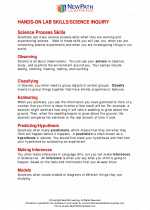 Hands-on Lab Skills/Science Inquiry - 3rd grade
Hands-on Lab Skills/Science Inquiry - 3rd grade  Worksheet/Answer key
Worksheet/Answer key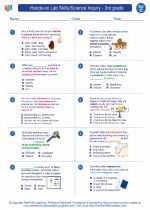 Hands-on Lab Skills/Science Inquiry - 3rd grade
Hands-on Lab Skills/Science Inquiry - 3rd grade  Worksheet/Answer key
Worksheet/Answer key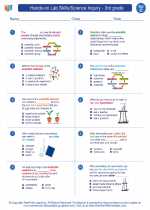 Hands-on Lab Skills/Science Inquiry - 3rd grade
Hands-on Lab Skills/Science Inquiry - 3rd grade  Worksheet/Answer key
Worksheet/Answer key Hands-on Lab Skills/Science Inquiry - 3rd grade
Hands-on Lab Skills/Science Inquiry - 3rd grade  Worksheet/Answer key
Worksheet/Answer key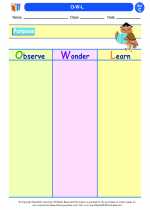 O-W-L
O-W-L  Vocabulary/Answer key
Vocabulary/Answer key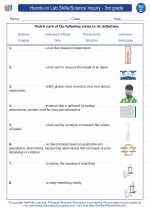 Hands-on Lab Skills/Science Inquiry - 3rd grade
Hands-on Lab Skills/Science Inquiry - 3rd grade  Vocabulary/Answer key
Vocabulary/Answer key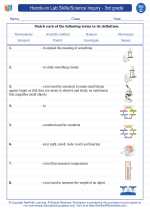 Hands-on Lab Skills/Science Inquiry - 3rd grade
Hands-on Lab Skills/Science Inquiry - 3rd grade 

 Worksheet/Answer key
Worksheet/Answer key
 Worksheet/Answer key
Worksheet/Answer key
 Worksheet/Answer key
Worksheet/Answer key
 Worksheet/Answer key
Worksheet/Answer key
 Vocabulary/Answer key
Vocabulary/Answer key
 Vocabulary/Answer key
Vocabulary/Answer key

The resources above cover the following skills:
Science as Inquiry and Process: A student should understand and be able to apply the processes and applications of scientific inquiry. A student who meets the content standard should:
Develop an understanding of the processes of science used to investigate problems, design and conduct repeatable scientific investigations, and defend scientific arguments.